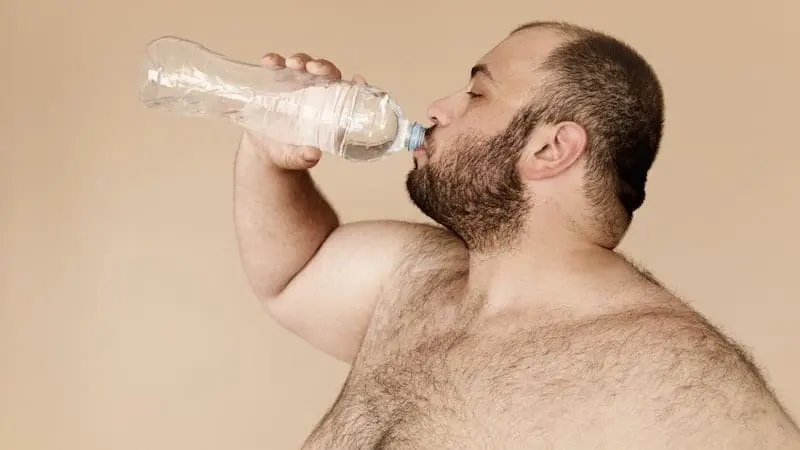
The best online fitness resource you'll ever need. We filter out the BS to ensure you meet your health and fitness goals!

The best online fitness resource you'll ever need. We filter out the BS to ensure you meet your health and fitness goals!
The weight loss associated with a water fast have three main contributing factors: gender, weight, and the duration of the water fast itself. If you’re considering going on a water fast and curious what potential weight loss you might experience, you can try our Water Fasting Weight Loss Calculator below:
The Water Fasting Weight Loss Calculator does exactly what its name suggests – calculates the amount of body weight you would lose during a water fast.
A water fast is a type of fasting that involves consuming only water for a specific period of time, typically ranging from a few days to several weeks. This practice is believed to have various health benefits, including improved insulin sensitivity, a reduction in inflammation, and of course weight loss!
Note that the result the water fasting calculator provides is only an estimate and should not be taken as gospel. You can only determine exactly how much weight you will lose once you’ve completed your water fast.
The calculator uses your gender, current weight, and the intended duration of your water fast as inputs to estimate the weight loss.
Research has shown that the percentage of average weight loss was found to be slightly larger in men than in women.
Using the calculator is pretty easy. Just follow the steps outlined below:
The amount of weight loss determined by this calculator are approximations and vary from person to person and other variables which we detail below. Please consult your local medical professional for advice.
To be able to use the Water Fasting Weight Loss Calculator effectively in conjunction with your actual water fasting, you should be re-checking your approximate weight loss calculation weekly (every 7 days).
This is because as you fast, you will be losing weight (duh!) and that means your starting weight will change. Due to the approximate nature of the calculator, there may be some inherent error associated with calculations greater than 7 days.
As an example, say you take the plunge (pun intended) and start water fasting. Your stats are:
Entering this into the calculator, you will get a total approximate weight loss of 27.76 lbs.
However, a week into the fast, you step on a set of scales and take note of your weight as 212 lbs – a loss of 8 lbs. If we’d entered 7 days instead in our calculation above, the approximate weight loss should have been 11.2 lbs, a difference of 3.2 lbs from the actual weight loss. This means that you were losing weight slower than what the calculator estimated.
That is why we suggest re-evaluating the weight loss calculations every 7 days to decrease the discrepancies between the estimated and actual weight loss values as you progress during the fast.
Research from combat athletes, for instance, regularly show up to 20 pounds of weight loss in the days and weeks leading up to a fight where they rapidly cut down on food to “make weight”. Those not following a rigorous training regime as combat athletes have been shown to lose an average of 14 pounds in the first week of a water fast.
However, all of this has to be taken with a grain of salt since the amount of weight you can lose during a water fast depends on so many variables.
Our Water Fasting Weight Loss Calculator can only “guesstimate” the weight loss based on studies. And it only takes into account gender and current weight – it’s not an exact science, but it gives you a general idea of what’s actually possible… at least!
As a general rule of thumb, the more you weigh the more water you’ll hold (more room for it) and the less you weigh the less you’ll hold (less room for it).
This means that people on a water fast who are “bigger” to start with will lose more weight when compared to those who are smaller.
Depending on which end of the spectrum you sit at the beginning of your water fast will ultimately have a major impact on your total weight loss.
This is not the only caveat though.
Understanding the other variables involved is key for determining total weight loss during a water fast.
As with most things regarding weight loss, the true answer has more shades of grey than black and white so how you approach water fasting shouldn’t be taken lightly.
So although our Water Fasting Weight Loss Calculator only takes into account your gender and current weight, there are actually other variables at play that can affect how much weight you can actually lose. These are:
Let’s dive in and explain some of their nuances so you get the full picture.
Weight loss and fat loss are not the same thing.
When you pop on the scales, you’re weighing everything in your body (including muscle, food, water, body fat, your heart, liver, spleen, kidneys, bones, etc.) weighs a given amount. However only some percentage of your total body weight is body fat.
If we look at different athletes for example, lean athletes might only have 8-10% body fat. This means that only 8-10% of their total weight is fat. So, a 200-pound athlete with 10% body fat is carrying 20 pounds (200 * 0.10 = 20) of body fat.
The remaining 180 pounds of weight is muscle, bones, water, etc. We call this remainder lean body mass.

In contrast, if a person who has the same “weight” is 50% body fat, only 100 pounds is lean body mass. As leaner muscle tissue holds more water than non-muscle tissue, the leaner individual would lose more weight if both of them started a water fasting.
The more muscle you have, the more storage site you have for water. From a health standpoint the leaner individual is also much healthier as they are carrying less body fat.
More carbs = more water retention and visa versa.
For every 1g or carbohydrates in the body you’ll typically store 3g of water. Think about when you cook pasta in water it absorbs the water into it. A similar process happens in the body.
As such, when you water fast, you’re cutting out carbohydrates. The knock-on effect of this is that water no longer has anything to stick to which in turn naturally limits your body’s water retention abilities.
The amount of carbohydrates your body stores typically comes down how much muscle mass you have, your DNA, and previous training.
We can make some rough estimates for adults which is around 400g based on previous research. So in a water fast we would be looking to drop 1.2 litres of water (400 * 3g) which would have otherwise been retained naturally by the body.
This also means that if someone has a typically higher carb diet and is of similar stature to another person who follows a lower carb diet, then the person on the higher carb diet will lose more “weight” albeit mostly water when they start water fasting.

Other foods also have high water content so if these are part of your diet before the fast, you’ll likely get an extra pound or two drop from cutting these out too. Typically, we are talking about fruits and veggies such as:
The more you drink the more you lose.
It sounds strange that the amount of water you drink during an actual water fast also has a direct impact on how much you lose.
For many years, a practice known as “water loading” has been used to manipulate weight loss. It’s commonly used by those in “weight cutting sports” like boxing, MMA, and wrestling.
In its simplest form, the more water you drink the more you pee and thus the more weight you will lose while water fasting. Scientifically speaking this happens by “tricking” the hormones in charge of fluid balance in the body. These hormones are:
When you drink excess water well beyond what you need to stay hydrated, the sodium content in the body decreases, and in turn, aldosterone is secreted to combat the low sodium and regulates sodium resorption.
ADH then directly supports water resorption. Because of these interactions, consuming excessive amounts of water can induce a higher amount of water loss and subsequently extra “weight loss”.
The longer you fast the more weight you will lose.
This goes without saying, but it’s always as simple as it seems.
While rapid weight loss can be a big motivator, you can only go so long without food – which is somewhere in the region of two months. Anything after that would just be increasing your chances of seeing your maker, and that’s not a risk worth taking just to lose weight.
Say, hypothetically, that you actually make it to the two month mark of a water fast, the weight you’d be losing at that point wouldn’t be just be fat, it would also consist of muscle tissue and it’s a downward spiral from there.
After your glucose stores are used up, your body will begin to use protein stores to provide energy. This process will affect your muscles and can carry your body along for about three days until eventually you’re in starvation mode.
WARNING: Anyone attempting to undertake an extended period of water fasting (longer than 72 hours) should do so under medical supervision.
There is no strict rule that says how long a water fast should last. The general rule of thumb suggests water fasting should only last for up to 72 hours – and even shorter if you’re working out during the fast. Anything longer may potentially pose some health risks such as dizziness.
However, there have been several studies that support the contrary.
One showed that going on a water-only diet for 5 days actually promotes anti-aging properties as well as decreases the risk of health conditions arising from metabolic syndrome.
Another study found that water fasting is safe for up to 8 days and anything longer may become detrimental to your health. This longer period of fasting actually demonstrated decreases in stress levels, significant weight loss, and an elevated level of ketosis.
So although our Water Fasting Weight Loss Calculator allows you to enter up to 60 days for your fasting duration, it doesn’t mean you should actually fast for that long. It’s merely an indicator to show you what’s possible.
It’s also important to be aware of certain signs that indicate that you may have to cut your intended water fast duration short.
Again, we cannot stress enough how important it is to seek a medical professional for advice if you’re looking to water fast for longer than 72 hours.
You might also be interested in:
This was a great article! Exactly what I’ve been looking for!
Thanks Redwing! Hope it’s been helpful for you!
Thanks bro it helped me lot for helping in my journey.
You’re welcome Kanha!